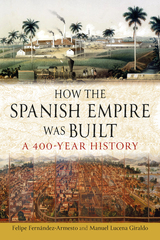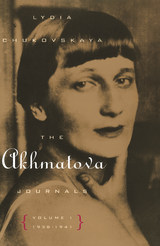
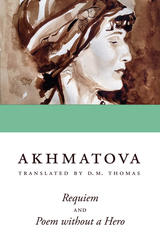
With this edition Swallow Press presents two of Anna Akhmatova’s best-known works that represent the poet at full maturity, and that most trenchantly process the trauma she and others experienced living under Stalin’s regime.
Akhmatova began the three-decade process of writing “Requiem” in 1935 after the arrests of her son, Lev Gumilev, and her third husband. The autobiographical fifteen-poem cycle primarily chronicles a mother’s wait—lining up outside Leningrad Prison every day for seventeen months—for news of her son’s fate. But from this limbo, Akhmatova expresses and elevates the collective grief for all the thousands vanished under the regime, and for those left behind to speculate about their loved ones’ fates. Similarly, Akhmatova wrote “Poem without a Hero” over a long period. It takes as its focus the transformation of Akhmatova’s beloved city of St. Petersburg—historically a seat of art and culture—into Leningrad. Taken together, these works plumb the foremost themes for which Akhmatova is known and revered. When Ohio University Press published D. M. Thomas’s translations in 1976, it was the first time they had appeared in English. Under Thomas’s stewardship, Akhmatova’s words ring clear as a bell.
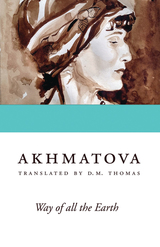
Anna Akhmatova is considered one of Russia’s greatest poets. Her life encompassed the turmoil of the Russian Revolution and the paranoia and persecution of the Stalinist era: her works embody the complexities of the age. At the same time, she was able to merge these complexities into a single, poetic voice to speak to the Russian people with whom she so closely and proudly identified.
Way of All the Earth contains short poems written between 1909 and 1964, selected from Evening, Rosary, White Flock, Plantain, Anno Domini, Reed, and The Seventh Book. Intricately observed and unwavering in their emotional immediacy, these strikingly modern poems represent one of the twentieth century’s most powerful voices.
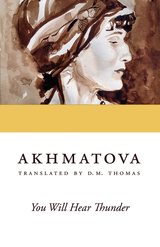
Anna Akhmatova lived through pre-revolution Russia, Bolshevism, and Stalinism. Throughout it all, she maintained an elegant, muscular style that could grab a reader by the throat at a moment’s notice. Defined by tragedy and beauty in equal measure, her poems take on romantic frustration and the pull of the sensory, and find power in the mundane. Above all, she believed that a Russian poet could only produce poetry in Russia.
You Will Hear Thunder spans Akhmatova’s very early career into the early 1960s. These poems were written through her bohemian prerevolution days, her many marriages, the terror and privation of life under Stalin, and her later years, during which she saw her work once again recognized by the Soviet state. Intricately observed and unwavering in their emotional immediacy, these strikingly modern poems represent one of the twentieth century’s most powerful voices.
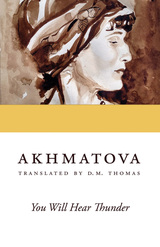
Anna Akhmatova lived through pre-revolution Russia, Bolshevism, and Stalinism. Throughout it all, she maintained an elegant, muscular style that could grab a reader by the throat at a moment’s notice. Defined by tragedy and beauty in equal measure, her poems take on romantic frustration and the pull of the sensory, and find power in the mundane. Above all, she believed that a Russian poet could only produce poetry in Russia.
You Will Hear Thunder spans Akhmatova’s very early career into the early 1960s. These poems were written through her bohemian prerevolution days, her many marriages, the terror and privation of life under Stalin, and her later years, during which she saw her work once again recognized by the Soviet state. Intricately observed and unwavering in their emotional immediacy, these strikingly modern poems represent one of the twentieth century’s most powerful voices.
READERS
Browse our collection.
PUBLISHERS
See BiblioVault's publisher services.
STUDENT SERVICES
Files for college accessibility offices.
UChicago Accessibility Resources
home | accessibility | search | about | contact us
BiblioVault ® 2001 - 2024
The University of Chicago Press



